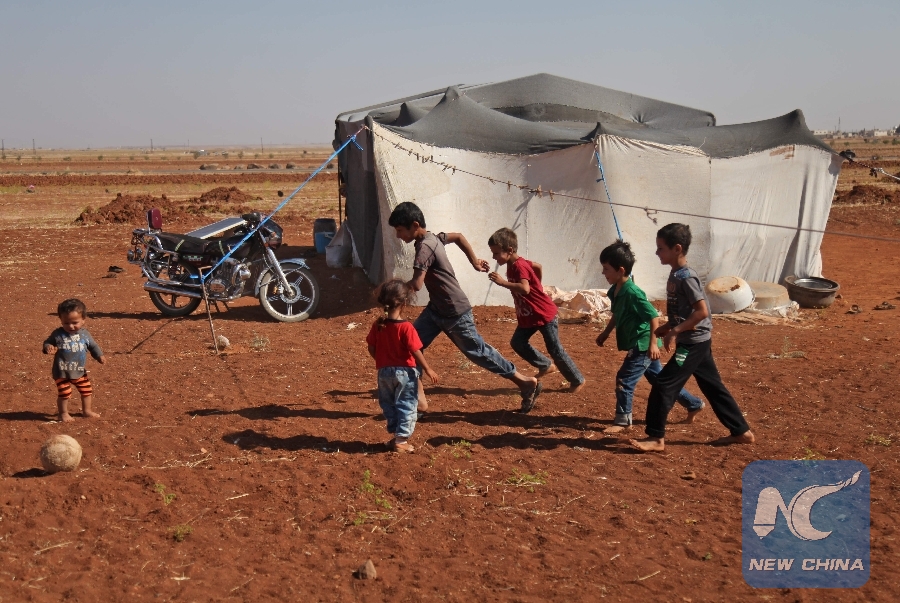
Syrian children play with a ball outside a tent at a camp for displaced civilians fleeing from advancing Syrian government forces, close to a Turkish military observation point near the village of Surman in the rebel-held northwestern Idlib province on Sept. 5, 2018. (Xinhua/AFP)
WASHINGTON, Sept. 4 (Xinhua) -- Although Washington escalated its rhetoric against a possible attack by Syrian government forces against rebels in Idlib Province on Tuesday, experts have said it is unlikely the Trump administration will launch another military attack against Syria.
U.S. Secretary of State Mike Pompeo on Tuesday spoke with Turkish Foreign Minister Mevlut Cavusoglu, and they agreed that a possible attack in Idlib Province is an "unacceptable, reckless escalation" of the current conflict in Syria.
Earlier on Tuesday, the White House said that it "is closely monitoring the situation in Idlib" and would "respond swiftly and appropriately" if Syria uses chemical weapons, echoing the tweet of U.S. President Donald Trump earlier on Monday that Syria "must not recklessly attack Idlib Province."
"Hundreds of thousands of people could be killed. Don't let that happen!" Trump said. However, in April Trump had ordered a military attack in Syria over the government's alleged use of chemical weapons in the country.
Since earlier this year, the Syrian rebels were driven out of key areas in the capital Damascus, the central province of Homs and the southern region. The government's army has been amassing forces and military gear around Idlib in recent weeks, as a major battle against the rebels in Syria looms.
Brookings Institution senior fellow Darrell West told Xinhua that "Trump put Syria, Russia, and Iran on notice" that he will not tolerate attacks in Idlib.
"He wants to avoid another wave of violence that harms innocent civilians and puts more refugees on the road to Europe. He is drawing a bright line in the sand and telling government forces not to cross that line," he said.
But he warned that "there is a high likelihood that the U.S. would launch counter-attacks against the Syrian military," if Syria continues with its military actions in the province.
However, Wayne White, former deputy director of the Middle East Intelligence Office of the U.S. State Department, told Xinhua that "how far President Trump would go to back up his warning is unknown."
"He frequently tosses out warnings or threats, foreign and domestic, on Twitter, but does not consistently back them up. A Russian statement today indicates the Russians remain undeterred," he said. "Without a clear and credible U.S. military red line, the Syrians probably will make some sort of military move toward Idlib."
David Pollock, a scholar at the Washington Institute for Near East Policy, said that "it's very unlikely (that Trump will take military action)," since Trump's remarks so far are "focused on the humanitarian and the moral aspects of the situation in Idlib, not on a specific American threat or red line."
"Unless (Bashar al) Assad and his helpers, Russia and Iran, use chemical weapons again on a large scale, I don't think the United States is likely to take any military action," he said, adding that since Syria's "military offensive, including heavy Russian air bombardments, against the armed groups in Idlib Province have already started."
Lt. Col. Daniel L. Davis, a defense expert at the U.S. think tank Defense Priorities, told Xinhua that "the hard question American policymakers must answer before using military force yet again in Syria is this: Would the use of American military power in Syria either a) stop the fighting, or b) preserve U.S. interests? The hard truth is no to both."
"Russia has a vital national interest in making sure Assad remains in power ... We, on the other hand, have no enduring interests in Syria. To risk a military clash with Russia that in a worst-case scenario could spiral out of control into a war is the height of foolishness," he said.
"America should only use military force to counter direct threats or actual attacks against U.S. citizens or our homeland," he added. "However, as egregious the humanitarian situation in Syria is -- and it is horrific to be sure -- the use of more military power will almost certainly worsen, not help, the very civilians we claim to want to protect."
"America's best play for a Middle East policy would be to contain the violence there, prevent it from spreading to the U.S. and our allies, and avoid inflaming the conflict," he said. "Risking a military clash with Russia in the Middle East would be a major setback to our interests in the region."
Nevertheless, Davis admitted that there is indeed a likelihood that Washington will launch military strikes against Syria.
"Beyond question Washington should not launch military strikes against Syria, but the Trump administration has already done so twice, with no apparent adverse consequences," he said. "My fear is that the administration may believe it can continue to launch missile strikes with no consequences."
A Russian retaliation, however, cannot be ruled out should there be a next time, he said.
West also said that "an American move would make an already tense region even more tense."
"It would run the risk of direct confrontation between U.S. and Russian or Iranian forces, and that situation could escalate dramatically," he said.

